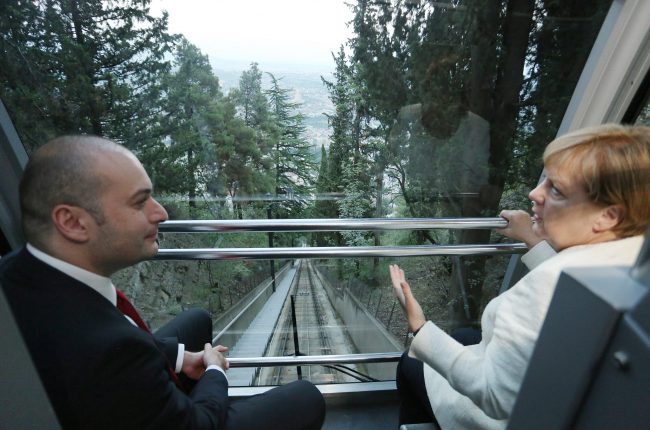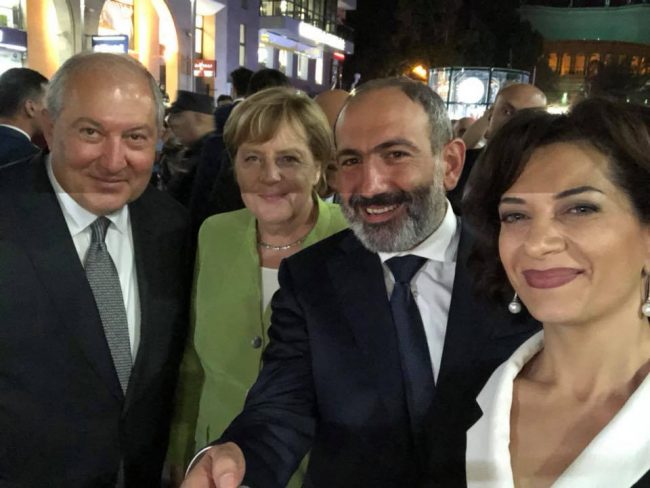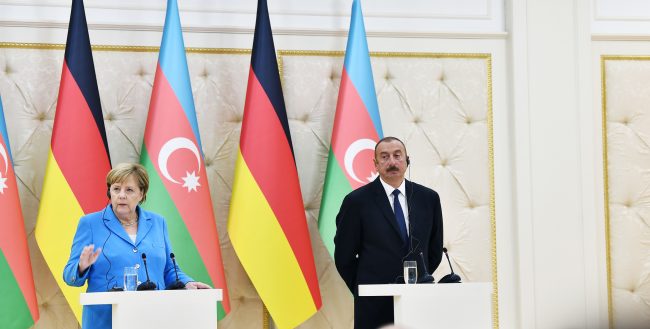

 German Chancellor Angela Merkel has concluded a three-day long tour to the South Caucasus. During her trip Merkel faced questions about Georgia’s Western ambitions, her position on the region’s conflicts, and human rights abuses in Azerbaijan, and also suggested Georgians may soon be able to work in Germany.
German Chancellor Angela Merkel has concluded a three-day long tour to the South Caucasus. During her trip Merkel faced questions about Georgia’s Western ambitions, her position on the region’s conflicts, and human rights abuses in Azerbaijan, and also suggested Georgians may soon be able to work in Germany.
Merkel kicked off her South Caucasus tour in Georgia. During her visit to Tbilisi State University, Merkel said Germany would introduce ‘work quotas for Georgia and West Balkan countries’ that would allow workers from certain fields to work legally in Germany.
At a press-conference following her meeting with Georgian Prime Minister Mamuka Bakhtadze, the German Chancellor said the number of Georgian asylum seekers in Germany had increased after visa liberalisation. The new visa regime, which came into effect for Georgia in March 2017, allowed Georgians to travel without visas to 26 Schengen Area countries for up to three months.
She noted that Prime Minister Bakhtadze had promised ‘the numbers will go down further’, and said the issue was not a ‘big problem’, adding that Germany now considered Georgia a ‘safe’ country of origin — something that would simplify deportation procedures.
Bakhtadze said the number of Georgians seeking asylum in Germany had already decreased by 70% from January.
This, in addition to Georgian organised crime syndicates in Germany and other European countries, led some officials in Tbilisi to speculate that the EU could invoke visa suspension mechanism. The mechanism is a part of the visa-free deal and can be activated if the EU faces large numbers of illegal overstays, if it is affecting the security situation, or if a significant number legally seek to stay beyond 90 days.
Merkel abstained from making ‘hasty promises’ on Georgia’s integration into the EU, saying that Georgia was not being considered an active membership candidate country, as currently only the Western Balkans were on the EU’s enlargement agenda.
Her comments echoed messages from the 5th Eastern Partnership summit declaration in November, which left Georgia, Moldova, and Ukraine, the EU’s three ‘associated’, Eastern partners that aspire for membership, with little promises for EU enlargement beyond the Western Balkans.
Of Georgia’s NATO membership ambitions, Merkel said during a meeting with students that given the conflicts in Abkhazia and South Ossetia, Germany’s position was not to support a fast-tracked membership for Georgia. The Chancellor confirmed her support for Georgia’s territorial integrity and called the situation regarding the conflict zones a ‘great injustice’.
Merkel visited the village Odzisi, on the South Ossetian border, along with the EU Monitoring Mission.
During her two day visit to Georgia, the Chancellor also met with political opposition parties European Georgia and the United National Movement (UNM). After the meeting, Davit Bakradze, presidential candidate from European Georgia, said Merkel had ‘promised’ German support in implementing an EU resolution on Georgia’s Otkhozoria-Tatunashvili sanctions list.
Armenia: Visa liberalisation and Nagorno-Karabakh
Merkel started her visit to Armenia on 24 August by paying tribute to victims of the Armenian Genocide at the Tsitsernakabert Memorial in Yerevan. The Chancellor referred to the 1915–1917 atrocities against ethnic Armenians in the Ottoman Empire as ‘heinous crimes’ but avoided using the term ‘genocide’. However, she made reference to a 2016 Bundestag resolution recognising the Armenian Genocide.
Holding separate meetings with Prime Minister Nikol Pashinyan and President Armen Sarkissian, Merkel vowed her country’s support for the peaceful resolution of conflict over Nagorno-Karabakh, expressing Germany’s readiness to play a more active role in the peace process.
Merkel also promised to help Armenia implement its ‘Comprehensive and Enhanced Partnership Agreement’ with the EU, and complemented Armenia as exemplary in balancing relations with Russia and the EU.

‘It is unlikely that the EU and Eurasian Economic Union will hold talks in the nearest future, but I think the Armenian example shows that such an opportunity might appear in the future’, Merkel said at the press-conference.
The EU–Armenia agreement is an alternative to more comprehensive ‘association agreements’ between the EU and Georgia, Moldova, and Ukraine.
Merkel said she would ‘do everything […] to achieve progress’ in visa liberalisation for Armenians wishing to travel to the EU, but also noted that the issue was ‘closely related to migration policy’.
At the end of her visit, the German Chancellor walked with Pashinyan and Sarkissian on the pedestrian North Avenue in Yerevan, taking selfies with Armenians.
Azerbaijan: natural gas and human rights
Rather than being greeted by the head of a state like in Armenia and Georgia, in Azerbaijan Merkel was welcomed upon landing by the country’s First Deputy Prime Minister Yaqub Eyyubov and the Deputy Foreign Minister Khalaf Khalafov. After visiting the Alley of Martyrs to pay respect to Azerbaijani war heroes, Merkel met President Ilham Aliyev.
At a press-conference following the meeting, Aliyev commented on the possibility of adding Turkmenistan to the South Caucasus Corridor (SGC), an EU-supported pipeline project to transport natural gas from the Caspian Sea to the EU through Azerbaijan, Georgia, and Turkey.
Aliyev said it was up to the Central Asian republic to show the initiative.
During the latest NATO summit in Brussels in July, US President Donald Trump called Germany a ‘captive of Russia’, referring to their reliance on Russian gas. The European Union receives about a quarter of its gas from Russia, mostly via Ukraine. This became a concern for some European countries after a series of price disputes over gas between Russia and Ukraine led to Russia cutting off the gas supply.
Worries about the EU’s energy dependence on Russia have been exacerbated by Nord Stream 2 — a joint venture between Russia’s Gazprom and several European companies to transport Russian gas through an undersea pipeline in the Baltic Sea to Germany’s Greifswald Bay. Critics have said it is aimed at sidelining Ukraine as a transit country.
Merkel, who supports the Nord Stream 2 project was forced to comment on the issue in Tbilisi, where she reiterated her position that Ukraine would remain an important gas transit country.

During the press-conference in Baku, Merkel called Azerbaijan ‘a big factor in the energy diversification of the EU’ and also hailed the opening of the Baku-Tbilisi-Kars railroad.
She said a ‘very frank discussion’ between her and Aliyev had also touched on the ‘domestic situation’ in Azerbaijan, including human rights. The German said she had argued that ‘a strong civil society must be part of an open, secular society’ and ‘made clear’ that Germany would like to see a ‘strong civil society’ in Azerbaijan.
Merkel also met with civil society and opposition figures, as well as formerly jailed investigative journalist Khadija Ismayilova.
The Chancellor’s visit to Azerbaijan was marred by Baku’s earlier decision to deny a visa to a member of the German delegation, MP Albert Weiler, for violating Azerbaijani law in visiting Nagorno-Karabakh without Baku’s permission. Weiler called the decision ‘undemocratic’, while Merkel vowed to raise the issue during the visit.
On 23 August, Nagorno-Karabakh’s Foreign Ministry slammed the decision, calling on the international community to condemn the practice of blacklisting those who visit Nagorno-Karabakh, describing it as a ‘gross violation of the rights to free movement’. Azerbaijani Foreign Ministry spokesperson Hikmet Hajiyev stated that being a member of the German parliament was ‘no ground to violate another country’s laws’.
While local press critical of the government were reportedly not allowed at the joint press-conference, Aliyev was asked by Deutsche Welle to address the human rights situation in Azerbaijan. Aliyev claimed the country was ‘committed to democratic values’ and ‘all freedoms, including freedom of speech and press’ were provided.
‘There are hundreds of press outlets functioning in Azerbaijan, among them are quite a few oppositional ones. That is, no one is persecuted, no one is punished for criticism and different point of view in Azerbaijan’, stated Aliyev.
In her reply to a similar question, the German Chancellor noted that discussions around democratic standards in Azerbaijan were taking place both ‘on a bilateral level and also within the framework of Council of Europe’. ‘We discussed these issues in details’, said Merkel.
Two days prior to Merkel’s visit, Azerbaijani political dissidents in Germany held a gathering in front of Merkel’s Berlin residence urging the Chancellor to raise issues of media and political freedoms, including political prisoners, during her meeting with the Azerbaijani leader.
Merkel’s South Caucasus tour included several gaffes, with a journalist from Deutsche Welle accidentally referring to Azerbaijan as ‘Afghanistan’ in her question to President Aliyev, the German government website and official social media channels showing a road with Armenian state flags as footage of Merkel’s trip to Azerbaijan, and according to Sputnik Deutschland, her official Instagram story showing scenery in Yerevan with the text ‘Guten Morgen aus Aserbaidschan’, which was reportedly taken down later.









